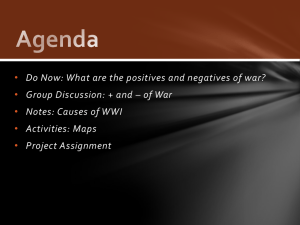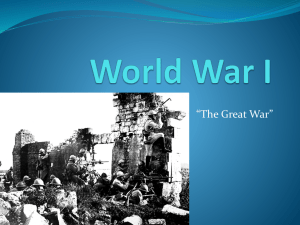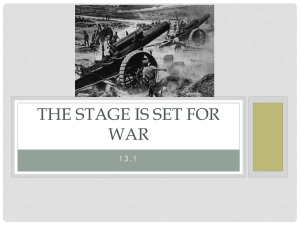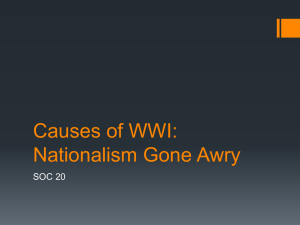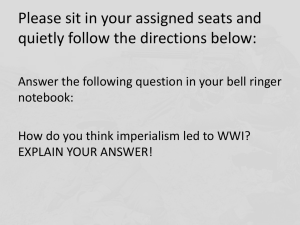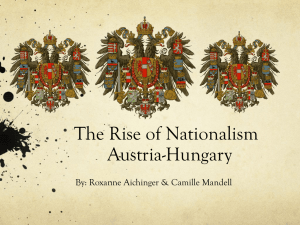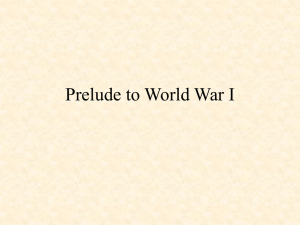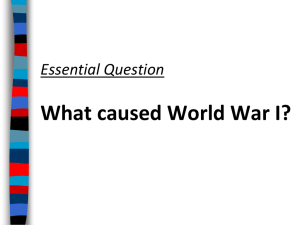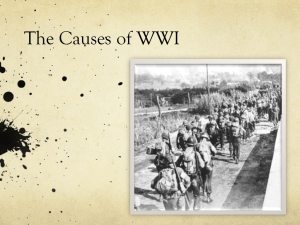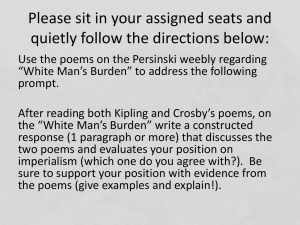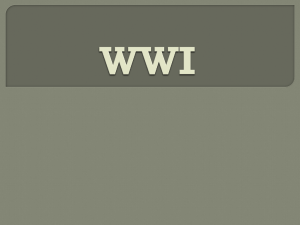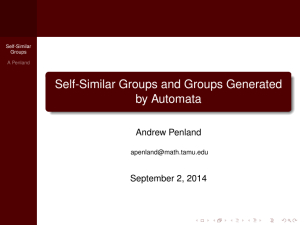imperialism
advertisement
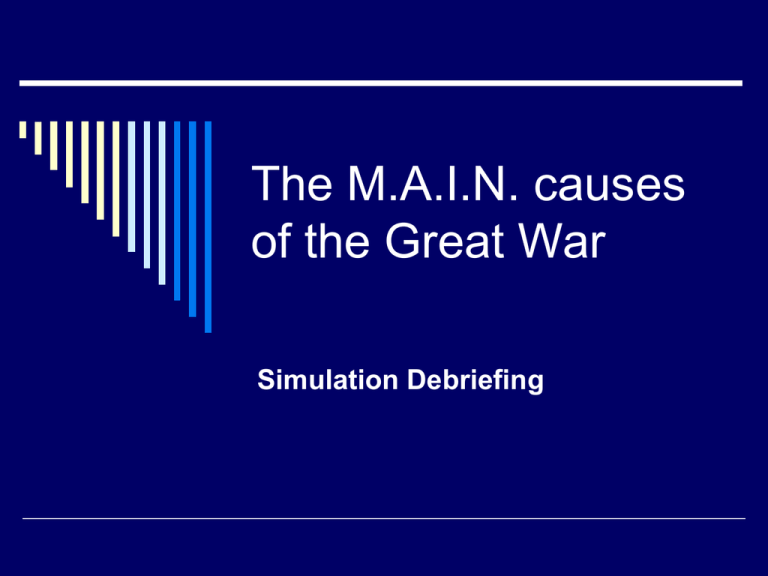
The M.A.I.N. causes of the Great War Simulation Debriefing The M.A.I.N. Causes of the Great War M = Militarism → A policy of glorifying military power & keeping a standing army always prepared for war The M.A.I.N. Causes of the Great War A = Alliances [Alliance System] → A series of treaties forging a “friendship”, uniting against a common threat The M.A.I.N. Causes of the Great War I = Imperialism → A policy in which a strong nation seeks to dominate other countries politically, economically, or socially The M.A.I.N. Causes of the Great War N = Nationalism →The belief that people should be loyal mainly to their nation-that is, to the people with whom they share a culture & history-rather than to a king or empire World Situation Summary All the 15 items of the third page of our handout relate to actual history Take careful note of events as presented in our simulation, and actual events as they occurred c. 1914. What were: Militaristic Alliances building Imperialistic Nationalistic 1. Your six nations represent the main factions in a troubled world situation. Penland = Germany Morovia = Austria-Hungary Sandia = Russia Caldonia = Great Britain Yorkton = France Possibly / probably America later Bahkan = Serbia – Which is part of the Balkan peninsula 2. There has been general peace on the continent for about fifty years. This peace has been hard to maintain in the rapidly changing, expanding, industrial and technical world. Pax Britannia The British Peace AKA The Peace of Britain The INDUSTRIAL REVOLUTION has brought about the “rapidly changing, expanding, industrial and technical world” The industrial revolution had to happen to simulate all of these events 3. There has been increased intervention in the underdeveloped parts of the world by opposing factions. Both Caldonia and Penland have made claim to some disputed territory in the “rubber rich” area of Asia. IMPERIALISM The scramble for colonies in Asia & Africa has conflict among the European powers. The Berlin Conference The Boer War Also! Problems in Morocco Problems in Fashoda IMPERIALISM The Industrial Revolution left many European nations depleted of natural resources and searching for new ones. 4. There has been a strong rivalry between Morovia and Yorkton centered around boundary disputes over the Great Forest area on their borders. A lot of intense competition between Europe’s Great Powers (Germany, Austria-Hungary, Great Britain, Russia, Italy, and France) Britain = home of Industrial Revolution Germany = home of fastest growing economy because of new industries Nationalism before WWI… Nationalistic rivalries grew out of territorial disputes Intense nationalism Demands for independence from empires 5. Yorkton has also been involved in controversies with Penland over control of the mouth of the Makeshift River. Yorkton currently controls the area. In the second half of the 19th Century both Germany and Italy unified into the nations we know (more or less) today. Each had been separate provinces or kingdoms unto themselves. In fact, wars break out over some controversies: The Crimean War The Seven Weeks War The Franco-Prussian War 5. Yorkton has also been involved in controversies with Penland over control of the mouth of the Makeshift River. Yorkton currently controls the area. (continued) Leaders of unification: Otto von Bismarck Giuseppe Mazzini Camillo di Cavour & Giuseppe Garibaldi 6. Bahkan is a relatively new nation, once having been a part of Morovia. They gained their independence peacefully under a previous government. Bahkan = Serbia which is a relatively new nation”, once being a part of Austria-Hungary (Morovia). Austria-Hungary has not completely let go of this fledgling “nation.” 7. Morovia is very interested in regaining Bahkan, although no overt action has been taken in that direction by the Morovian Government. Austria-Hungary does want Serbia back, in fact it wants that whole geographic area known as the Balkan Peninsula (or simply as The Balkans) back “safely” under its control. 8. There is a small nationalist group in Morovia demanding that their government retake Bahkan. It is suspected that this group has been leading border raids against Bahkan. (It is actually the other way around.) There are small nationalist groups all over the Balkans The all want independence from Austria-Hungary. *Notably a small nationalist group known as The Black Hand in Serbia. 9. Caldonia has been somewhat successful in keeping out of some of the squabbles because of her geographical isolation from the neighboring states. TRUE. Caldonia = Great Britain. Great Britain is “geographically” isolated from the neighboring states.” 10. It is common knowledge that Penland has the most powerful army on the continent. Caldonia is the strongest naval power. TRUE. Penland = Germany. Germany under Kaiser Wilhelm will build up its military They first concentrate on their army because of their geography… (Why?) 11. Various nations have entered into military alliances, which guarantee mutual support if war begins. Entangling Alliances Triple Alliance Germany Austria-Hungary Italy Triple Entente Great Britain Russia France There are also lesser alliances Russia has a historic alliance with Serbia 12. Major newspapers in each country have been carrying on feuds with each other and thereby have helped fan the flames of unrest and hatred within each nation True. 13. This is a time of extreme nationalism in which most countrymen support their respective governments to the fullest in foreign affairs. TRUE. Nationalism is particularly fever- pitched in the Balkans. There is a movement for a Pan-Slavic state Pan-Slavism: a push to unite all the Slavic peoples on the European continent Where is this quest? Austro-Hungarian Empire 14. Because of the fear between the various nations, generated by the uneasy peace, there has been a continual race to build military armaments. TRUE. Germany especially is working hard to catch up technically and militarily to Great Britain.… Perhaps there was a little “sibling rivalry.” It just made other countries feel afraid 15. Sandia has been troubled by domestic unrest, and the government is not considered to be too stable. There have been reports that a large faction of unemployed workers and peasants are banding together and are planning a revolution. At this point there is no reliable information which would indicate that they would be successful. TRUE. Russia’s leader Czar Nicholas II He is aloof to the concerns of the people. The PROLETARIAT (the workers) is considering revolution There will be one before the war ends. We’ll study that later News Flash #1 - Morovia's vice president has been shot and killed by alleged assassins in the State of Bahkan while on state visit. Archduke Franz Ferdinand of Austria-Hungary and his wife Sofie were assassinated while on a state visit to Sarajevo, which is the capital of Bosnia (it’s just to the west of Serbia.) The assassin was a Serbian member of that small nationalist group known as The Black Hand. June 28, 1914 Austria-Hungary issues an Diplomacy takes place for a month, but… with the “security” of alliances, no one backs down A month later the war will begin… July 28, 1914 “The war to end all wars" OR “The Great War” has begun … for now
